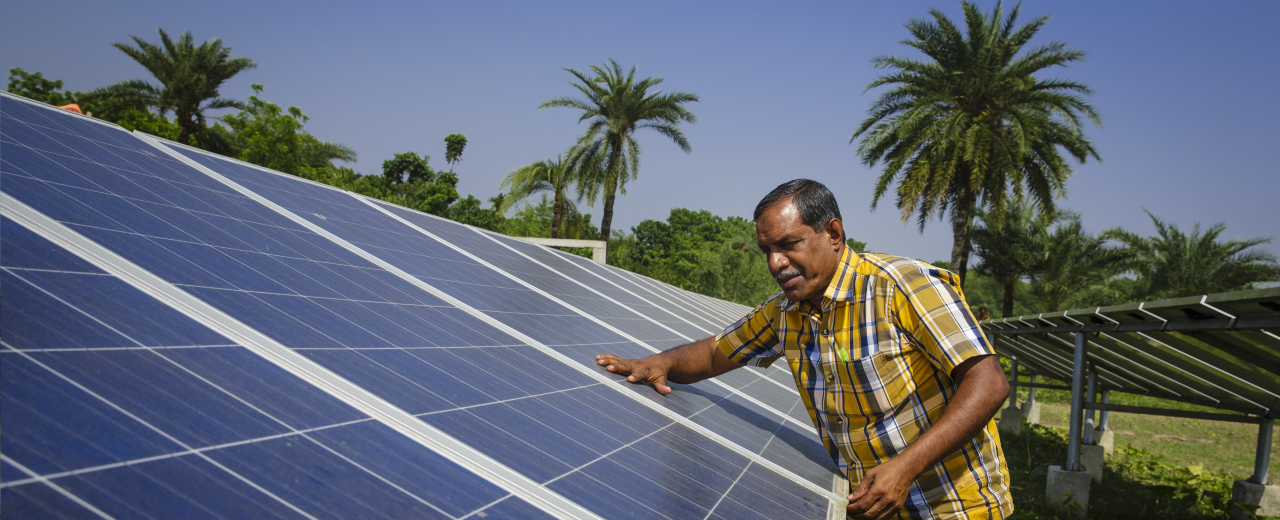
As of: 03/2024
Bangladesh has hugely increased the population’s electricity supply: in 2010, only half of households were connected to the power grid, but today every family has access to electricity. However, the supply is still not reliable and sufficient. Businesses are struggling with power outages. The government is now promoting the expansion of renewable energies. KfW, commissioned by the German Federal Government, is supporting Bangladesh in this process and is providing funds for photovoltaic systems for companies, solar-powered pumps for irrigation and biogas plants.
Bangladesh has made great strides in energy production in recent years. It has succeeded in tripling its power generation capacity in the last ten years. However, the process of expanding renewable energy production is still in its infancy. In addition, in rural areas, where the majority of the population lives, there is still a lack of sufficient and reliable electricity supply.
Businesses often suffer from power cuts, sometimes on a daily basis. This hinders production and results in lost sales. At the same time, the government is focusing on continuous economic growth. Bangladesh’s energy demand is therefore expected to increase further in the coming years.
Since its independence in 1971, Bangladesh has relied primarily on local natural gas supplies for its energy supply, but these are diminishing. Dependence on climate-damaging and expensive imported fossil fuels is increasing. Although the fossil fuels natural gas, oil and coal will remain the most important energy sources in the medium term, the government is working hard to expand electricity generation from renewable energy sources in order to
Bangladesh is one of the most densely populated countries in the world. Land is therefore a scarce and expensive commodity. Around 70% of the surface area of Bangladesh is used for agriculture. People depend on the land to produce food and secure an income. In view of the scarcity of land, rooftops offer a great deal of potential for a socially compatible expansion of solar energy.

Commissioned by the German Federal Government, KfW is providing funds for solar and biogas systems. The project aims to convince companies to install solar panels on their roofs. This sustainably generated electricity will benefit the entire population when it is fed into the grid. Where connection to the grid is not possible, solar power will be used locally. In many places, diesel-powered irrigation pumps will be replaced by solar-powered pumps. Domestic biogas plants allow households with more than two cows to produce clean gas. Commercial biogas plants can be used for both gas production and power generation.
KfW is cooperating on the project with the Infrastructure Development Company Limited (IDCOL), a public-sector financial institution (non-bank). IDCOL will receive a low-interest loan of EUR 60 million, which will be used to provide loans for the first commercial solar rooftop programme in Bangladesh. IDCOL will also receive a further EUR 8.5 million in grants to subsidise financing for solar irrigation systems and biogas plants. IDCOL will receive additional support with a complementary measure of EUR 1.5 million to guarantee compliance with technical, economic, social and environmental standards. This ensures that these standards will be observed early on when the technology is introduced on the market. IDCOL itself will provide loans to companies, investors, non-governmental organisations and interested groups to finance renewables.
With the help of the project:
Another project with IDCOL is currently in the preparation phase. Commercial solar parks in particular are to be financed with an additional subsidised loan in the amount of EUR 80 million. A further EUR 18.5 million is available for investment grants for off-grid renewable energy and EUR 1 million for technical support.
The project will increase the expansion of renewable energies and thereby improve access to environmentally and climate-friendly electricity in Bangladesh. At the same time, it will help to make the energy supply in Bangladesh more reliable, modern and climate-friendly. Renewable energy provides cost-effective and environmentally friendly access to energy, even in areas where the national grid is not yet developed. In addition, renewable energy will replace energy sources such as diesel, which are damaging both to the environment and to human health. This will improve the population’s living conditions, strengthen the local economy and prevent greenhouse gas emissions.
The project contributes to achieving these United Nations Sustainable Development Goals:
KfW Group
KfW Development bank
KfW Office Dhaka
Share page
To share the content of this page with your network, click on one of the icons below.
Note on data protection: When you share content, your personal data is transferred to the selected network.
Data protection
Alternatively, you can also copy the short link: https://www.kfw-entwicklungsbank.de/s/enzB1T9J
Copy link Link copied